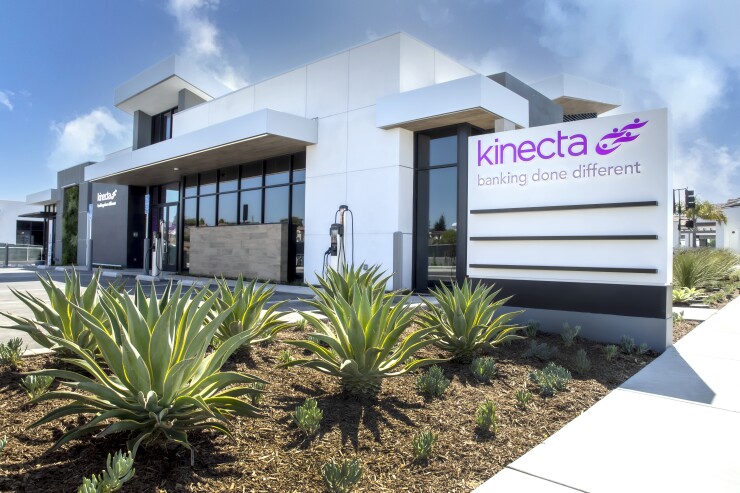
When Donna McNeely took on the role of president of Kinecta Financial Management in late 2022, she knew that attracting younger consumers would be tough. She saw young people putting their money in
"Defensively, we all know that funds are leaving our institutions daily to digital investment platforms, and these companies have now entered the banking business," said McNeely, whose business is a unit of Kinecta Federal Credit Union in Manhattan Beach, California.
Within her first few months on the new job, she got to work building a nimble wealth management platform of her own, in partnership with wealth management software firm FusionIQ.
Consumer interest in investing tools has
"All institutions are competing to become the primary financial institution for new and existing customers, [and] a platform that provides digital investing for all members makes the institution more attractive," McNeely said. "As an offensive move, this platform would be considered a sticky product, strengthening the retention of banking customers." The wealthtech offering could become a source of fee revenue for the credit union as well.
Leaders of
Work on the integration of the FusionIQ One platform into the $6.8 billion-asset Kinecta digital banking channels began in February of 2023. The first key feature allowed members to access the new products and services through their web and mobile banking accounts without needing to sign in again.
The credit union debuted the white-labeled digital advice platform in September, concluding the first phase of a lengthy development period. After taking a risk tolerance questionnaire to identify their goals and determine their appetite for volatility, members are provided with a score corresponding to a suite of pre-made investment models using exchange-traded funds and other vehicles to reach a target balance, for a monthly fee of $3.50 and an annual fee of 0.30% for balances of more than $14,000. The firm facilitates the purchasing of these investments as a registered investment advisor through its internet-only advisor IQvestment.
The second module of the platform, self-directed investing, went live in December. For $3.50 per month, investors can build their own portfolios of ETFs, fractional shares and other standard items using an online brokerage account supported by FusionIQ's partnership with the Nashville-based broker-dealer Arete Wealth. The platform also supports alternative investments like cryptocurrency.
The ability to purchase fractional shares was necessary to accommodate the needs of both large and small-dollar investors, McNeely said.
FusionIQ is among a pool of companies that work either in tandem with financial institutions or directly with consumers to provide wealth management tools. With well-known organizations like
"The vast majority of consumers have more than one financial relationship, and if they aren't using these products with the bank, it would be naïve to think they aren't using these products elsewhere," said Nick Lane, senior director at Cornerstone Advisors.
Arta Finance, an investment software fintech launched in 2021, leverages its certification as a registered investment advisor to run a "digital family office" offering access to products such as U.S. Treasuries and alternative asset funds featuring investments in private equity, real estate and more. Assets are stored at BNY Mellon's Pershing, which provides clearing and custody services to wealth management and institutional firms.
"People want their financial institutions to offer easy-to-use, well-designed experiences to level up their financial IQ. … Many services have traditionally been reserved for the ultra-wealthy, so when you're able to extend these 'financial superpowers' of wealth management, customers can easily see how you're adding value to their lives," said David Shapiro, co-founder of Arta Finance.
Past research conducted by the
This lack of coverage created a
Experts with Datos Insights say that these tools are most effective when designed for consumers across the wealth spectrum and not just high-value individuals.
"Credit unions and other financial institutions have belatedly realized that investing does not begin with a five- or six-figure brokerage account, but rather, with a first paycheck," said William Trout, director of securities and investments for Datos Insights. "The ability to start small has real appeal for retail investors, who appreciate the ease of use, low cost and transparency of digital wealth management solutions."
Partnerships between credit unions and wealth tech firms are often a necessity, as regulatory and capital hurdles hinder leaders who want to internally build member-facing personal finance management and advisory platforms. But while outside partnerships can be risky, choosing not to offer these tools can be an even bigger risk.
"[Member] relationships are very valuable to credit unions. … While they may not be registered investment advisors or broker dealers, they can focus on their existing value proposition" and seek outside help for the rest, said Mark Healy, chief executive of FusionIQ.









